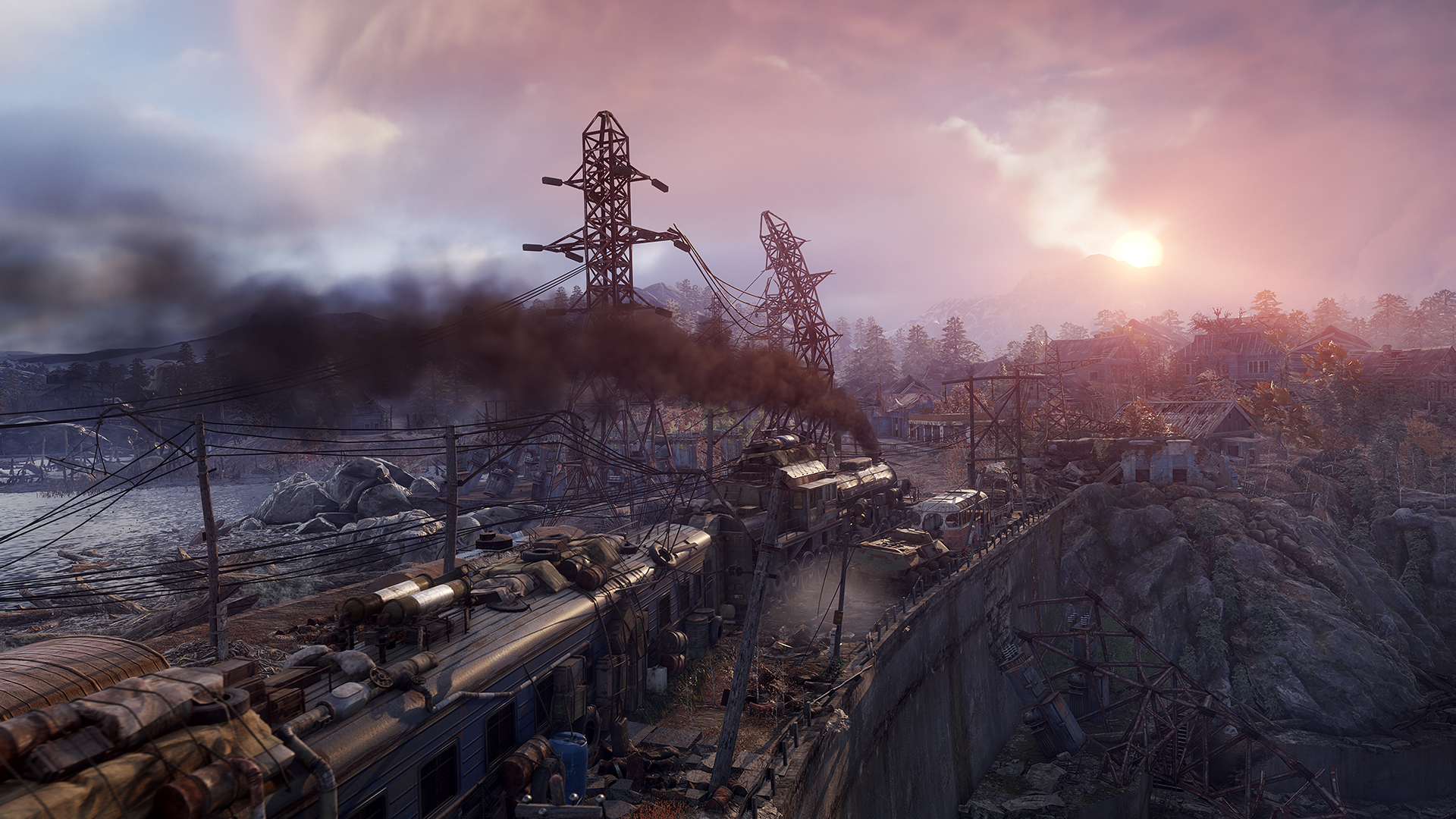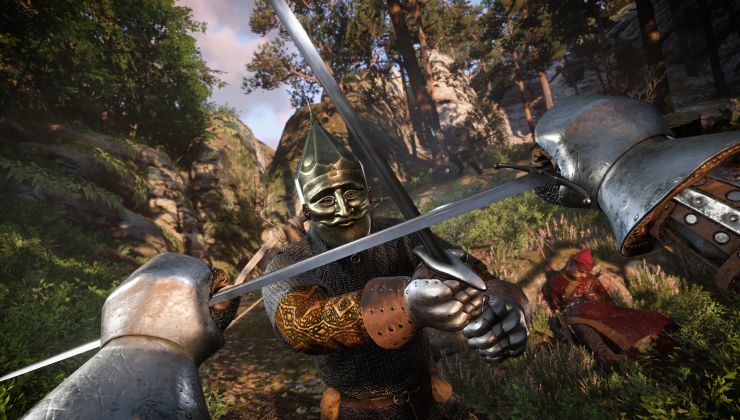4A Games have confirmed in an official 10th anniversary update post today that Metro Exodus is still going to release for Linux and macOS as well.
They gave a small overview in the post about what's been going on like celebrating the first release of Metro 2033 which arrived back in March 2010. Not only that, they recently got acquired by Embracer Group who also control Koch Media, Saber Interactive, THQ Nordic and others. Specifically, 4A Games are now an independently run subsidiary of Saber Interactive.
For people waiting on official Linux support for Metro Exodus, there's good news. While it has been confirmed for a while now, they have been somewhat quiet on it. When mentioning about bringing it to the latest consoles with the Xbox Series X and the PlayStation 5 they also said this:
Aside from these enhanced versions for Gen 9, we recently brought Metro Exodus to more players through Amazon’s ‘Luna’ streaming service; and we’re also working on dedicated Linux* and Mac versions of the game. We’ll share more information about these closer to release.
*Emphasis ours.
Also confirmed is a new Metro game that is officially under development. They're not sharing anything on that, other than it being built for all modern tech as it's targeting PCs and the latest consoles. 4A also confirmed their commitment to "delivering a great story driven single player experience". On top of that, with Saber's help they're exploring a proper multiplayer Metro title but it's not clear if it will be part of the next Metro game or a title by itself.
Quoting: rustybroomhandleAlso, we're not talking about DXVK under wine/Proton, but dxvk library used with a native Linux binary. It's not emulated, it's a proper port.1) Strictly speaking, WINE is not an emulator as it does not implement software imitations of different hardware, thus, no WINE wrapped game should be called "emulated"; this "proper port" is no more "proper" than any random WINE-wrapped release;
2) DXVK implements DirectX® API (more precisely, Direct3D® 11™) so, ported or not, this (soon™ to be) release is built around a Microsoft® proprietary API with all its quirks and gotcha's in mind;
3) this technique is hardly anything new (see ["Winelib"](https://wiki.winehq.org/Winelib) method of getting a native ELF executable via WINE-compilation).
I wonder, how many Linux gamers will re-purchase the game after the (upcoming) release. It's been two years already and I've heard a game gets written off of the accounts (by AAAAA-publishers) after the initial one-month-release-period (at least this time frame is often suggested as crucial for DRM protection).
Quoting: Alm888I know "Wine Is Not an Emulator" because it does not emulate hardware, but since it still abstracts the API of one OS to run on another OS, "emulator" is a perfectly fine shorthand for that.Quoting: rustybroomhandleAlso, we're not talking about DXVK under wine/Proton, but dxvk library used with a native Linux binary. It's not emulated, it's a proper port.1) Strictly speaking, WINE is not an emulator as it does not implement software imitations of different hardware, thus, no WINE wrapped game should be called "emulated"; this "proper port" is no more "proper" than any random WINE-wrapped release;
2) DXVK implements DirectX® API (more precisely, Direct3D® 11™) so, ported or not, this (soon™ to be) release is built around a Microsoft® proprietary API with all its quirks and gotcha's in mind;
3) this technique is hardly anything new (see ["Winelib"](https://wiki.winehq.org/Winelib) method of getting a native ELF executable via WINE-compilation).
I wonder, how many Linux gamers will re-purchase the game after the (upcoming) release. It's been two years already and I've heard a game gets written off of the accounts (by AAAAA-publishers) after the initial one-month-release-period (at least this time frame is often suggested as crucial for DRM protection).
And I meant "proper" as in it is native code, as opposed to Windows binaries running under WINE.
I know how a wine-wrapped build works. The Metro port, incidentally, is NOT that either. It just uses dxvk for graphics API translation.
I notice I had you blocked. Wonder why.
But there's been so few truly AAA titles released with same-day Linux support, it must be hard to gauge the impact of Linux sales in any other way.
Quoting: rustybroomhandleI know "Wine Is Not an Emulator" because it does not emulate hardware, but since it still abstracts the API of one OS to run on another OS, "emulator" is a perfectly fine shorthand for that.And by that extension, using DXVK to abstract a Direct3D API to Vulkan API shall be considered "emulation". Pure logic, how the saying goes: if it looks like a duck, walks like a duck…
Quoting: rustybroomhandleAnd I meant "proper" as in it is native code, as opposed to Windows binaries running under WINE.Sorry, can you elaborate a bit? What constitutes a "native code" for you? And why it is any different from "Windows binaries"?
You know, being an "*.exe" does not make a "Windows binary": some Mono bytecode files are "*.exe", which does not make these files "Windows binaries". Besides, "*.exe" (or more correctly, "Portable Executable", descendant of ["COFF"](https://en.wikipedia.org/wiki/COFF) ) is just a executable code packaging format, nothing more. And while I'm no programmer, it is not evident for me that ELF format is superior (inferior) to COFF/PE. And you do know that after the executable code was unpacked by a [loader](https://en.wikipedia.org/wiki/Loader_%28computing%29) (be it "ld" or WINE loader) into RAM and was appended to a CPU queue, it ultimately makes no difference for application behavior from there on, right?
Ultimately, it is underlying API dependencies and technologies used in the code that makes something a "Windows binary", is it not?
And what, if the same code using Windows® API was duct-taped with the Direct3D to Vulkan translation layer and repackaged into (arbitrary more true and holy) ELF format, that makes this code suddenly stop being Windows-oriented?
Quoting: rustybroomhandleI know how a wine-wrapped build works. The Metro port, incidentally, is NOT that either. It just uses dxvk for graphics API translation.Oh, is it so?
And as for your blockade, sorry but I will not return you the favor, as I do not block anybody (I prefer to hear opinions, even if I am not happy with them). :(
Quoting: Alm888Ultimately, it is underlying API dependencies and technologies used in the code that makes something a "Windows binary", is it not?The fact that it uses your native system loader makes the difference. Not to mention that on link time they had to use native linux libraries.
And what, if the same code using Windows® API was duct-taped with the Direct3D to Vulkan translation layer and repackaged into (arbitrary more true and holy) ELF format, that makes this code suddenly stop being Windows-oriented?
We already had this discussion many times. Your concept of "native" is more related to the software architecture, while our concept is more related on how a binary is loaded and run by the OS. So, like it or not, you may want to differentiate your concept from the other as both are corrects if applied in the right context.
The main problem I see with using DXVK is that people know what it is, what it's used for and thus they complain about it. If they had used another layer altogether, nobody would have known what it was and everyone would be having a nice day and all.
Just so you know:
https://www.reddit.com/r/linux_gaming/comments/5cis3p/feral_interactives_indirectx/
https://github.com/ValveSoftware/ToGL
Last edited by omer666 on 26 Nov 2020 at 3:47 pm UTC
Quoting: omer666If using a DirectX to Vulkan translation layer means the port isn't native, I'm afraid we don't have many native Linux ports, as far as AAA games are concerned.I think people are very exigent on what means "a real port" and sometimes forgot that the delivery of a software product on a platform it isn't just about code but also about QA and support. More than 50% of the time invested in a port is probably dedicated to testing... and that's also something we pay when buying a product.
The main problem I see with using DXVK is that people know what it is, what it's used for and thus they complain about it. If they had used another layer altogether, nobody would have known what it was and everyone would be having a nice day and all.
Quoting: x_wingYour concept of "native" is more related to the software architecture, while our concept is more related on how a binary is loaded and run by the OS.OK, I can understand that for someone executable file format can be psychologically important.
But what really irks me is that one can bash a Winelib-port (totally a full-fledged ELF executable) and go as far as accusing WINE to be an emulation, while at the same time praising a DXVK-wrapped port.
Apparently, WINE has a bad reputation here and even mentioning WINE is considered an insult (despite official support from the devs), while DXVK is perceived to be a god-sent for Linux games. So, even comparing usage of DXVK to WINE-wrapping is considered blasphemous by some.
If (when) the game is released with official Linux support, IMO it should not matter what technique was used as long as the quality is reasonably high.
Otherwise I would just suicide knowing every Linux game using Unity3D has over 100 DLL files:
$ file ./AlwasLegacy_Data/Managed/mscorlib.dll
./AlwasLegacy_Data/Managed/mscorlib.dll: PE32 executable (DLL) (console) Intel 80386 Mono/.Net assembly, for MS Windows
Unfortunately Vulkan Ray Tracing was finished only recently, even worse only Nvidia supports it at the time. So it's understandable devs cannot wait for that feature, goes without saying that the studio has to move on to newer projects in order to survive.
Now that Vulkan has RT, here's hoping the studio will switch to it instead of persisting with DX12, that would be a mistake.
Quoting: Alm888I’m not sure if this is already known, but I’m posting this link anyway https://github.com/Joshua-Ashton/dxvk-native/issues/1Quoting: x_wingYour concept of "native" is more related to the software architecture, while our concept is more related on how a binary is loaded and run by the OS.OK, I can understand that for someone executable file format can be psychologically important.
But what really irks me is that one can bash a Winelib-port (totally a full-fledged ELF executable) and go as far as accusing WINE to be an emulation, while at the same time praising a DXVK-wrapped port.
Apparently, WINE has a bad reputation here and even mentioning WINE is considered an insult (despite official support from the devs), while DXVK is perceived to be a god-sent for Linux games. So, even comparing usage of DXVK to WINE-wrapping is considered blasphemous by some.
If (when) the game is released with official Linux support, IMO it should not matter what technique was used as long as the quality is reasonably high.
Otherwise I would just suicide knowing every Linux game using Unity3D has over 100 DLL files:
$ file ./AlwasLegacy_Data/Managed/mscorlib.dll
./AlwasLegacy_Data/Managed/mscorlib.dll: PE32 executable (DLL) (console) Intel 80386 Mono/.Net assembly, for MS Windows
See the use case of dxvk-native in the link which is not the same as dxvk.
Ps: just to be sure, I’m also much more interested that a game runs nicely and is supported, the technical implementation is really just a detail imho.
Last edited by jens on 26 Nov 2020 at 6:06 pm UTC
Quoting: Alm888...If (when) the game is released with official Linux support, IMO it should not matter what technique was used as long as the quality is reasonably high...This. Exactly my stance.
As for Wine Is Not an Emulator? It amazes me people still care about this recursive "joke" and the distinction it implies. It runs Windows software in Linux, with a performance hit. Who cares if it's actually a re-implementation of the underlying windows system calls? As Alm888 notes, if it looks like a duck, walks like a duck... we may as well call it a duck. No-one who isn't a pretty hard-core Linux nerd will care about whatever that distinction means in real terms.
Last edited by ziabice on 26 Nov 2020 at 6:29 pm UTC
I've been playing through the STALKER series and loving it. This gives me similar vibes, which I like.
Quoting: scaineMan, this is like the The Witcher 2 argument all over again. My personal view is that whatever is under the hood is largely irrelevant, provided it performs reasonably. That's a vague term, and dependent on your hardware, sure, but "native" for me is nothing to do with wine, dxvk, togl, indirectx or whatever is doing the translation. It's whether the developer is willing to put a Linux logo on the store front.You also probably think FPGA implementations are emulators? :p
As for Wine Is Not an Emulator? It amazes me people still care about this recursive "joke" and the distinction it implies. It runs Windows software in Linux, with a performance hit. Who cares if it's actually a re-implementation of the underlying windows system calls? As Alm888 notes, if it looks like a duck, walks like a duck... we may as well call it a duck. No-one who isn't a pretty hard-core Linux nerd will care about whatever that distinction means in real terms.
My favorite recursive acronym was MiNT, which initially stood for MiNT is Not TOS. Atari couldn't come up with their own mutitasking thing so snagged that and called it MiNT is Now TOS.
There is NO inherent performance hit with Wine. It is simply a matter of whether or not the APIs are are implemented correctly and they translate well to a performant equivalent in Linux. This is why somethings are faster and other things are slower. This is also why it is strictly NOT emulation. So you are calling a moose a duck just because it can quack.
Quoting: Alm888But what really irks me is that one can bash a Winelib-port (totally a full-fledged ELF executable) and go as far as accusing WINE to be an emulation, while at the same time praising a DXVK-wrapped port.And I completely agree with the last part you mention. But still, I also think that creating an specific build environment to get the game into our platform (i.e. working with native dependencies and a compiler for our platform) gives an extra value to their work as this means that game developers get away from their Windows building cage they usually live in.
Apparently, WINE has a bad reputation here and even mentioning WINE is considered an insult (despite official support from the devs), while DXVK is perceived to be a god-sent for Linux games. So, even comparing usage of DXVK to WINE-wrapping is considered blasphemous by some.
If (when) the game is released with official Linux support, IMO it should not matter what technique was used as long as the quality is reasonably high.
BTW, I don't think that Wine is blasphemous, I just appreciate more one work than the other.
Quoting: slaapliedjeYep. And, like, five people care about that distinction. Or fifteen. Hell, let's make it a couple of hundred. Ar we happy now? It's irrelevant!Quoting: scaineMan, this is like the The Witcher 2 argument all over again. My personal view is that whatever is under the hood is largely irrelevant, provided it performs reasonably. That's a vague term, and dependent on your hardware, sure, but "native" for me is nothing to do with wine, dxvk, togl, indirectx or whatever is doing the translation. It's whether the developer is willing to put a Linux logo on the store front.You also probably think FPGA implementations are emulators? :p
As for Wine Is Not an Emulator? It amazes me people still care about this recursive "joke" and the distinction it implies. It runs Windows software in Linux, with a performance hit. Who cares if it's actually a re-implementation of the underlying windows system calls? As Alm888 notes, if it looks like a duck, walks like a duck... we may as well call it a duck. No-one who isn't a pretty hard-core Linux nerd will care about whatever that distinction means in real terms.
My favorite recursive acronym was MiNT, which initially stood for MiNT is Not TOS. Atari couldn't come up with their own mutitasking thing so snagged that and called it MiNT is Now TOS.
There is NO inherent performance hit with Wine. It is simply a matter of whether or not the APIs are are implemented correctly and they translate well to a performant equivalent in Linux. This is why somethings are faster and other things are slower. This is also why it is strictly NOT emulation. So you are calling a moose a duck just because it can quack.
Quoting: scaineThere is a thing called latency and it is real. People who use things such as the MiSTer can pretty much tell right away the differences to the Raspberry Pi. So just because you don't care, does not mean others do not.Quoting: slaapliedjeYep. And, like, five people care about that distinction. Or fifteen. Hell, let's make it a couple of hundred. Ar we happy now? It's irrelevant!Quoting: scaineMan, this is like the The Witcher 2 argument all over again. My personal view is that whatever is under the hood is largely irrelevant, provided it performs reasonably. That's a vague term, and dependent on your hardware, sure, but "native" for me is nothing to do with wine, dxvk, togl, indirectx or whatever is doing the translation. It's whether the developer is willing to put a Linux logo on the store front.You also probably think FPGA implementations are emulators? :p
As for Wine Is Not an Emulator? It amazes me people still care about this recursive "joke" and the distinction it implies. It runs Windows software in Linux, with a performance hit. Who cares if it's actually a re-implementation of the underlying windows system calls? As Alm888 notes, if it looks like a duck, walks like a duck... we may as well call it a duck. No-one who isn't a pretty hard-core Linux nerd will care about whatever that distinction means in real terms.
My favorite recursive acronym was MiNT, which initially stood for MiNT is Not TOS. Atari couldn't come up with their own mutitasking thing so snagged that and called it MiNT is Now TOS.
There is NO inherent performance hit with Wine. It is simply a matter of whether or not the APIs are are implemented correctly and they translate well to a performant equivalent in Linux. This is why somethings are faster and other things are slower. This is also why it is strictly NOT emulation. So you are calling a moose a duck just because it can quack.
Last edited by slaapliedje on 28 Nov 2020 at 3:46 pm UTC
Quoting: scaineI care and I'm a rooster, so that counts for 10000000000000000 people.Quoting: slaapliedjeYep. And, like, five people care about that distinction. Or fifteen. Hell, let's make it a couple of hundred. Ar we happy now? It's irrelevant!Quoting: scaineMan, this is like the The Witcher 2 argument all over again. My personal view is that whatever is under the hood is largely irrelevant, provided it performs reasonably. That's a vague term, and dependent on your hardware, sure, but "native" for me is nothing to do with wine, dxvk, togl, indirectx or whatever is doing the translation. It's whether the developer is willing to put a Linux logo on the store front.You also probably think FPGA implementations are emulators? :p
As for Wine Is Not an Emulator? It amazes me people still care about this recursive "joke" and the distinction it implies. It runs Windows software in Linux, with a performance hit. Who cares if it's actually a re-implementation of the underlying windows system calls? As Alm888 notes, if it looks like a duck, walks like a duck... we may as well call it a duck. No-one who isn't a pretty hard-core Linux nerd will care about whatever that distinction means in real terms.
My favorite recursive acronym was MiNT, which initially stood for MiNT is Not TOS. Atari couldn't come up with their own mutitasking thing so snagged that and called it MiNT is Now TOS.
There is NO inherent performance hit with Wine. It is simply a matter of whether or not the APIs are are implemented correctly and they translate well to a performant equivalent in Linux. This is why somethings are faster and other things are slower. This is also why it is strictly NOT emulation. So you are calling a moose a duck just because it can quack.
On a serious note, the people behind Wine literally put Wine is not an emulator in the name, to prevent people from calling it an emulator. Because it is simply not an emulator. Yet you have people still calling it an emulator. Calling WINE an emulator is not far from calling DXVK an emulator.
Last edited by Shmerl on 27 Nov 2020 at 7:32 am UTC












 How to setup OpenMW for modern Morrowind on Linux / SteamOS and Steam Deck
How to setup OpenMW for modern Morrowind on Linux / SteamOS and Steam Deck How to install Hollow Knight: Silksong mods on Linux, SteamOS and Steam Deck
How to install Hollow Knight: Silksong mods on Linux, SteamOS and Steam Deck